- Learning time
- 20 minutes
- First play time
- 30 minutes
Regicide
Designed by: Andy Richdale,Luke Badger,Paul Abrahams
The beauty of Regicide is not just that you can play with a standard deck of cards, but also that the designers have made their own deck that can also be used as a standard deck of cards. If you can’t or prefer not to buy a copy, the rules can be downloaded here.
To prepare the game, shuffle the kings, queens and jacks and put them face-down in a pile with kings at the bottom and jacks on top. Shuffle the rest of the cards (if you’re playing with 3 or more players, the jokers are included) and deal all players a starting hand – hand sizes vary depending on player count, so four players will have five cards each but for a solo game you’ll have eight. The top jack in the deck of court cards is flipped and play begins.
The goal is for the players to collectively defeat the four jacks, queens and kings to win. But if even one player is defeated along the way, everyone loses. On your turn you play a card or cards from your hand to attack, and then discard cards from your hand to defend against the court card’s counter-attack. once a court card’s health hits zero, they are defeated, and the next enemy combatant flips over (if you defeat them with the exact amount needed, they go on top of the draw deck instead of the discard pile). The jacks health starts at 20 and attacks for 10. The queens’ health are 15 and attacks for 30, and the kings have a somewhat intimidating 20 attack/40 health.
For instance, the first card is the jack of hearts, with a starting health of 20. I play a nine to get the health down to 11, and then discard a ten and a five to defend against the counter-attack. Straightforward, but very mathy. However what makes Regicide engaging is that all the suits have a power. Clubs do twice their number value in damage to the court cards. Spades negate their attack (so a 10 of spades would do ten damage but also reduce the counter-attack by ten). Diamonds allow everyone to draw more cards from the deck – absolutely critical! – and hearts allow you to shuffle the discards and add a matching amount to the bottom of the draw deck. Managing not just the numbers, but the powers of each suit is critical to success. Additional tools in your armoury are 1. you can play matching numbers as long as they don’t add up top more than ten, and the combined total will have the power of both suits. 2. You can play aces with another card, both to add one to the number and potentially add an additional power to the total.
The catch? The suit of the court card negates the power until it is defeated: if it’s a club, then clubs don’t do double damage. If it’s a diamond, nobody can draw any cards! And so on. This can be slightly negated with the inclusion of jokers, which can be played simply to prevent this negation (in a 3 or 4 player game) or to refill your hand in a solo game. When one player finishes defending themselves, the next takes over. Finally, players are able to yield: ie, not attack, and simply defend for a turn. But if all players yield consecutively, you are defeated! An extremely clever game arises out of the classic 52 cards…
The guru's verdict
-
Take That!
Take That!
None from the other players - you all work in tandem
-
Fidget Factor!
Fidget Factor!
Pretty much absent - when it's not your turn, you need to be following - and conversing, although players are not allowed to share what cards they have - about tactics and strategy
-
Brain Burn!
Brain Burn!
It's an extremely tactical game, with the order the court cards appear very much influencing your chances of success. A seemingly good play can occasionally be undermined if the wrong suited enemy appears at the wrong time!
-
Again Again!
Again Again!
As a card game using a classic deck, there is less variation in experience than other games might offer. But it's still a real challenge, and the fall of the cards plays a big part in the battle



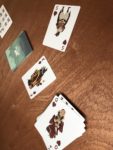

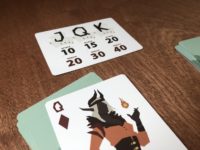
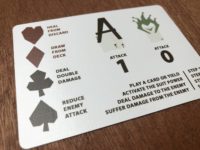
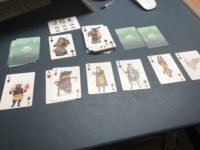


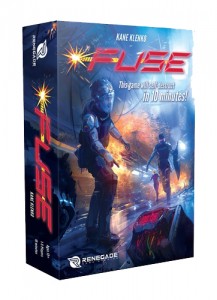


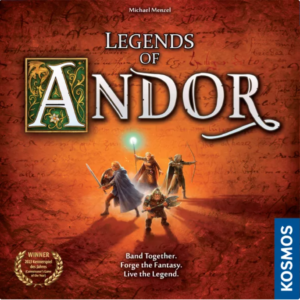

Sam says
I love cards - contract whist and cribbage being favourites - for their casual ease of play, but I enjoy Regicide for an alternative undertaking: a co-operative (or solo) challenge that feels bigger than the usual card-playing experience: and I'm really impressed with how these designers have concocted as much from standard deck. True, there's a fair degree of luck. But there's also proper decisions to be made, calculated risks and hugely satisfying moves that give Regicide a rather moreish feel.